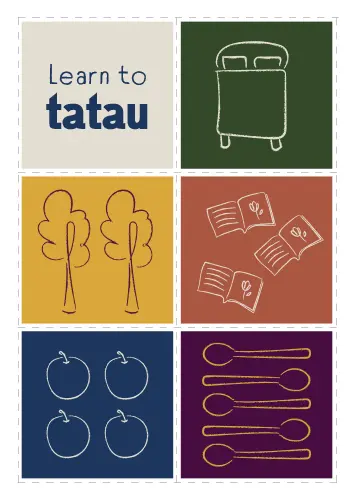
Maths learning
When tamariki are involved in activities that use matching, sorting, classifying, comparing, making patterns and identifying more, less and equal, they’re ‘playing’ with the foundations of mathematics and consolidating their learning and confidence.
Build on previous learning
The basic maths concepts tamariki have already been exploring are still important when they're aged 3 and 4 years old.
When tamariki have lots of opportunities to practise using these maths basics, their learning is consolidated and their confidence in maths understanding is growing. The more practice they have, the more sophisticated their understanding will become.
Everyday activities
Sometimes it may not seem so obvious, but maths is being used all the time – when we’re shopping, preparing meals and sharing kai, doing the washing, getting dressed, going for a walk, or playing with blocks, puzzles or card games. We’re always finding things that go together, organising things into groups, counting and using ideas about shapes, colour, size, number, position and pattern.
Playing with blocks, simple puzzles, shape-posting boxes and pegboards helps tamariki learn about size, shape, colour and one-to-one correspondence. And that’s all maths.
Wherever they are, whānau should be able to introduce maths through games. For example, when they’re out in the car they could be looking for different colours, different types of vehicles or basic shapes (circles, triangles and squares), or counting trucks, buses, cars, bikes, dogs, people walking and so on.
Hands, eyes and patterns
Threading is a popular activity that gives tamariki opportunities to count, match and make repetitive patterns. Many different and varied objects found in the home or out in nature can be thread onto wool or string. Buttons, beads, leaves, shells, cut-up straws, bottle tops or paper clips can all be used to increase active maths learning.
Tamariki aged 3 and 4 can play games such as snakes and ladders and Ludo, and card games such as ‘snap’, ‘fish’ and ‘memory’.
Having a balance in the types of activity is really important.
Some 3-year-olds will be beginning to understand the actual meaning of ‘one’, ‘two’ and ‘three’ – before now they’ve been able to chant the numbers, but without any real understanding of what they mean. Playing games that require them to choose ‘one’ object or identify ‘three’ things gives them practice in this developing skill.
Strengthening relationships
A board game or game of cards can directly involve a number of other people, and has the bonus of encouraging adults and children to talk to each other while having fun and strengthening their relationships.












